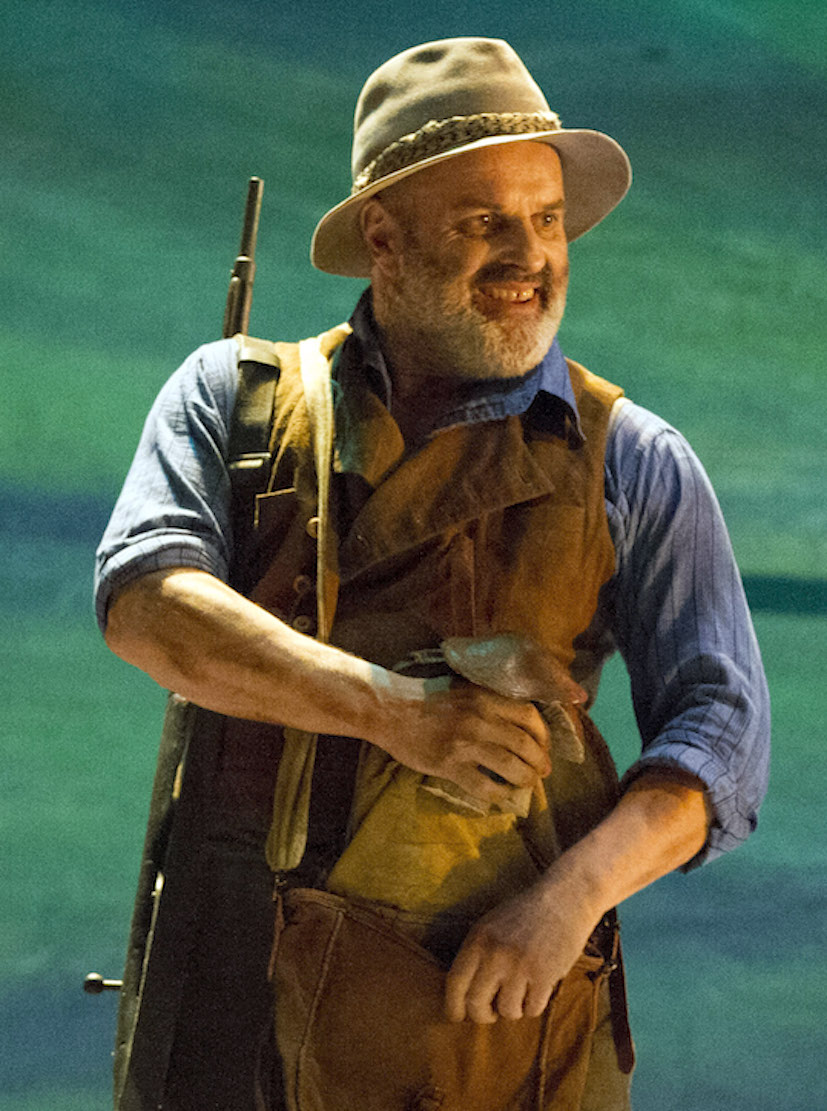Is The Cunning Little Vixen a jolly children’s pantomime, or is it a searching study of issues of life and death, Man and Nature? The answer, naturally, is that it’s both. Children dress up as animals, and sing and prance about. But at the same time grown-ups (both animal and human) dream and fantasize, couple and procreate, hunt and kill. Remarkably, it’s a tragedy that leaves no bitter taste. The heroine dies, but Nature goes on. The hardest thing to understand about hunters is that they identify with and even love their prey. But this is precisely the crux of Melly Still’s brilliant Glyndebourne production of Janáček’s masterpiece, revived after four years, and still as fresh as the forest in which it’s set.
Other productions have drawn attention to the work’s menopausal aspect, the way its central human character, the Forester, sees the renewal of life in the forest as a mirror of his own fading sexuality. But Still makes no bones about the work’s physicality as such. Although, as David Nice observed in his review of the production when it was new, not everything in this intricate fancy-dress display is entirely clear, one thing is very plain, and that is the sensuality of the human characters’ relation to the natural world.
The design achieves unforgettable effects with a backcloth that looks like a vertical Cresta Run
The Forester (Christopher Purves, or his double) embraces the Vixen; the long love duet between the Fox (Alžběta Poláčková) and the Vixen (Elena Tsallagova) that (nearly) ends the second act is delivered with a passionate physicality that would hardly be out of place in Act II of Tristan. We’re many a mile here from the cartoon strip that was Janáček’s source. This is adult drama in anthropomorphic dress, superbly committed under conductor Jakub Hrůša, and with a string of memorable vignettes from individuals too numerous to list.
It remains, nevertheless, an enchanting spectacle in its own right, designed with unfailing wit, colour and inventiveness by Tom Pye (the sets), Dinah Collin (the costumes), and Paule Constable (the lighting). Pye and Collin achieve unforgettable effects with a backcloth that looks like a kind of vertical Cresta Run up and down which the animals clamber and tumble, and with a gnarled central tree out of which creatures drop like spiders on strands of cobweb and under which the badger (Alexander Vassiliev) lives in his sett until evicted by Tsallagova’s ineffably self-assured Vixen.
 Costume after costume says something witty and essential about its wearer, from the vain and arrogant foxes with their portable brushes to the mosquito (Colin Judson), who bites the Forester with a safety-pin proboscis. Similarly the dances that are such a feature of the score (by choreographer Mike Ashcroft) have all the buzz and tumult of hot summer afternoons in the wild wood. This is one of the few operas that give director and designer licence to invent without risk of subversion, and here they take it with relish.
Costume after costume says something witty and essential about its wearer, from the vain and arrogant foxes with their portable brushes to the mosquito (Colin Judson), who bites the Forester with a safety-pin proboscis. Similarly the dances that are such a feature of the score (by choreographer Mike Ashcroft) have all the buzz and tumult of hot summer afternoons in the wild wood. This is one of the few operas that give director and designer licence to invent without risk of subversion, and here they take it with relish.
Hrůša’s reading is from the start robust; the delicacy, he is telling us, is there in the score and needs no special underlining. Above all, it’s a performance that moves, in both senses, with energy and emotional intensity. The orchestral playing (by the London Philharmonic) would be impossible to better. And the central performances are perfection: Tsallagova irresistible as the Vixen Sharpears, sexy and nubile, vocally seductive; Purves (pictured above), a Forester no better than he should be in human company but in the forest a thinker and feeler, profoundly touching in his final soliloquy about the rolling seasons; Poláčková a fine, eloquent Fox; Judson a village schoolmaster to the life (as well as the Badger, one of two or three doublings authorized by Janáček and taken on this occasion).
Janáček was 70, and in love with a much younger woman, when The Cunning Little Vixen was staged in Prague in 1924. He surely saw himself in it and earthed his emotions through it. And perhaps this, in the end, is the source of its secret charge, so beautifully tapped in this revival.















Add comment